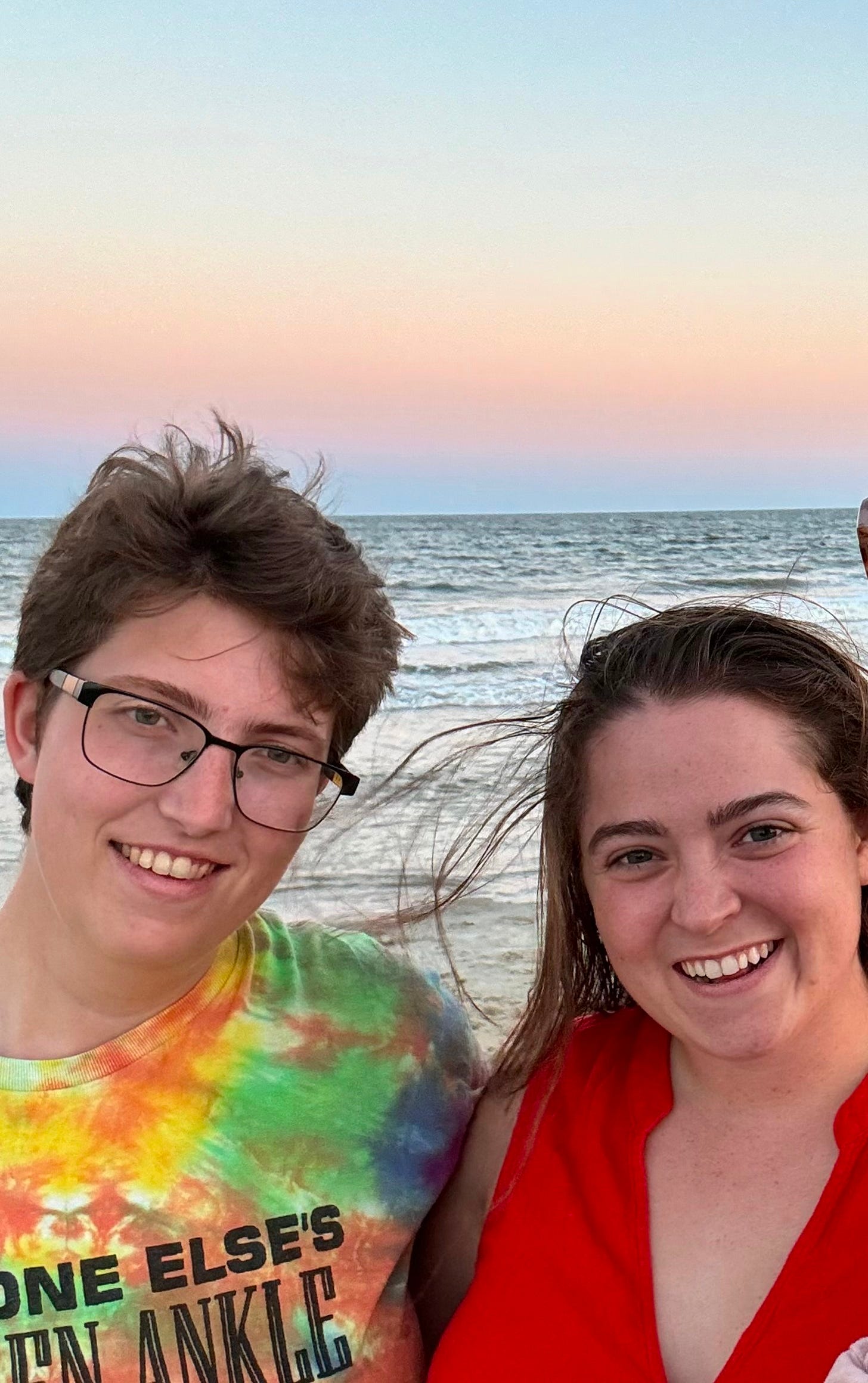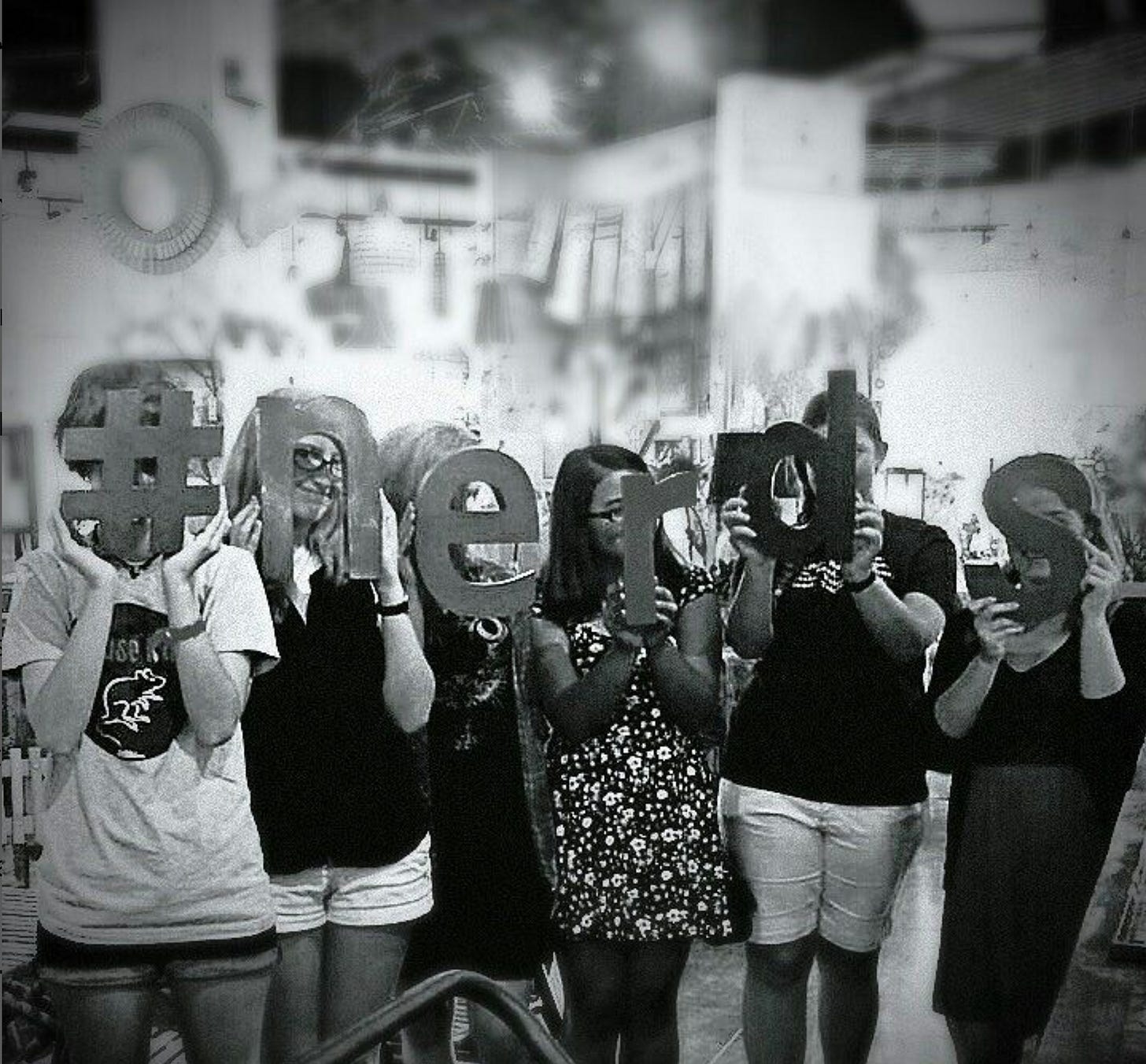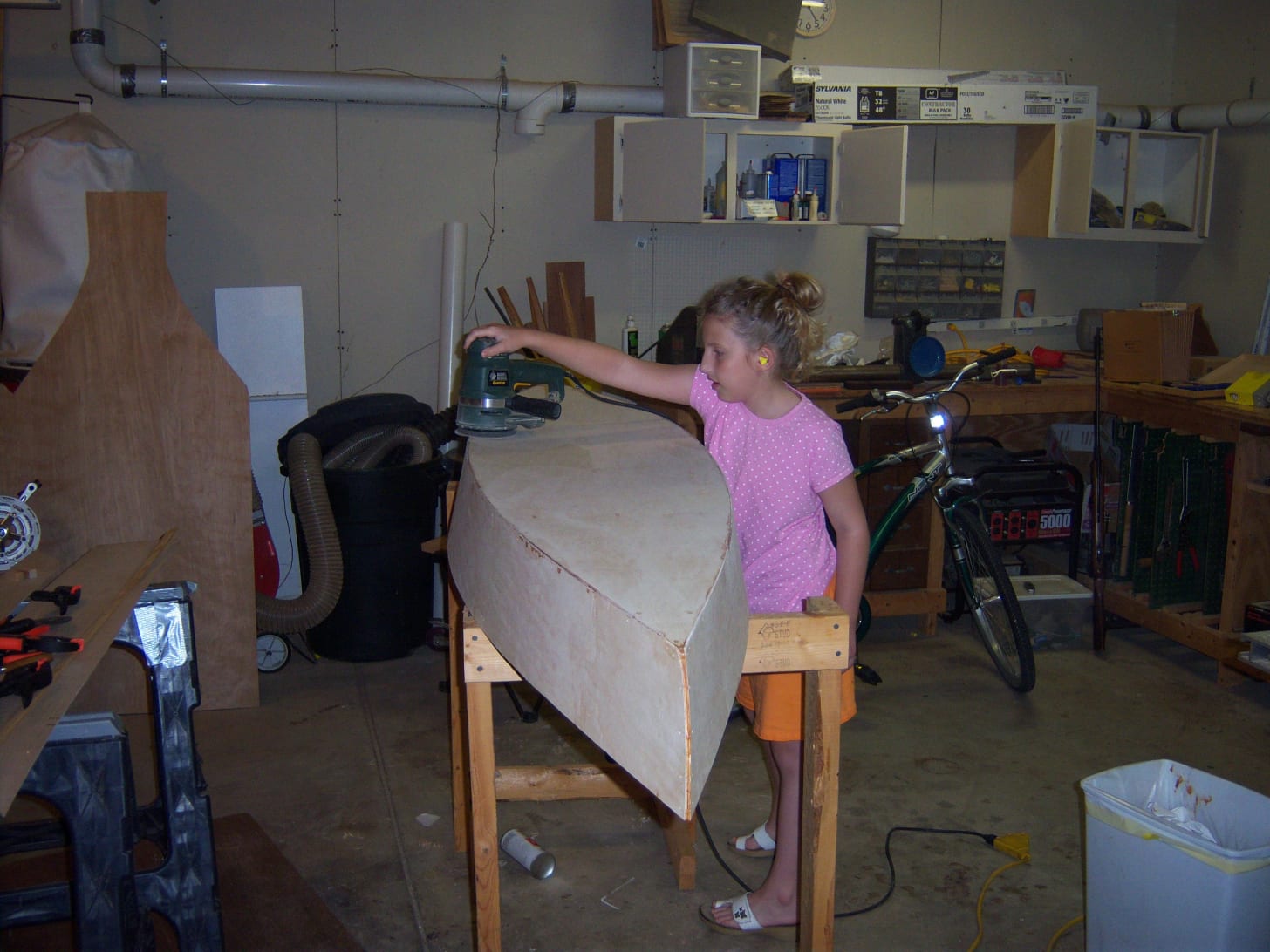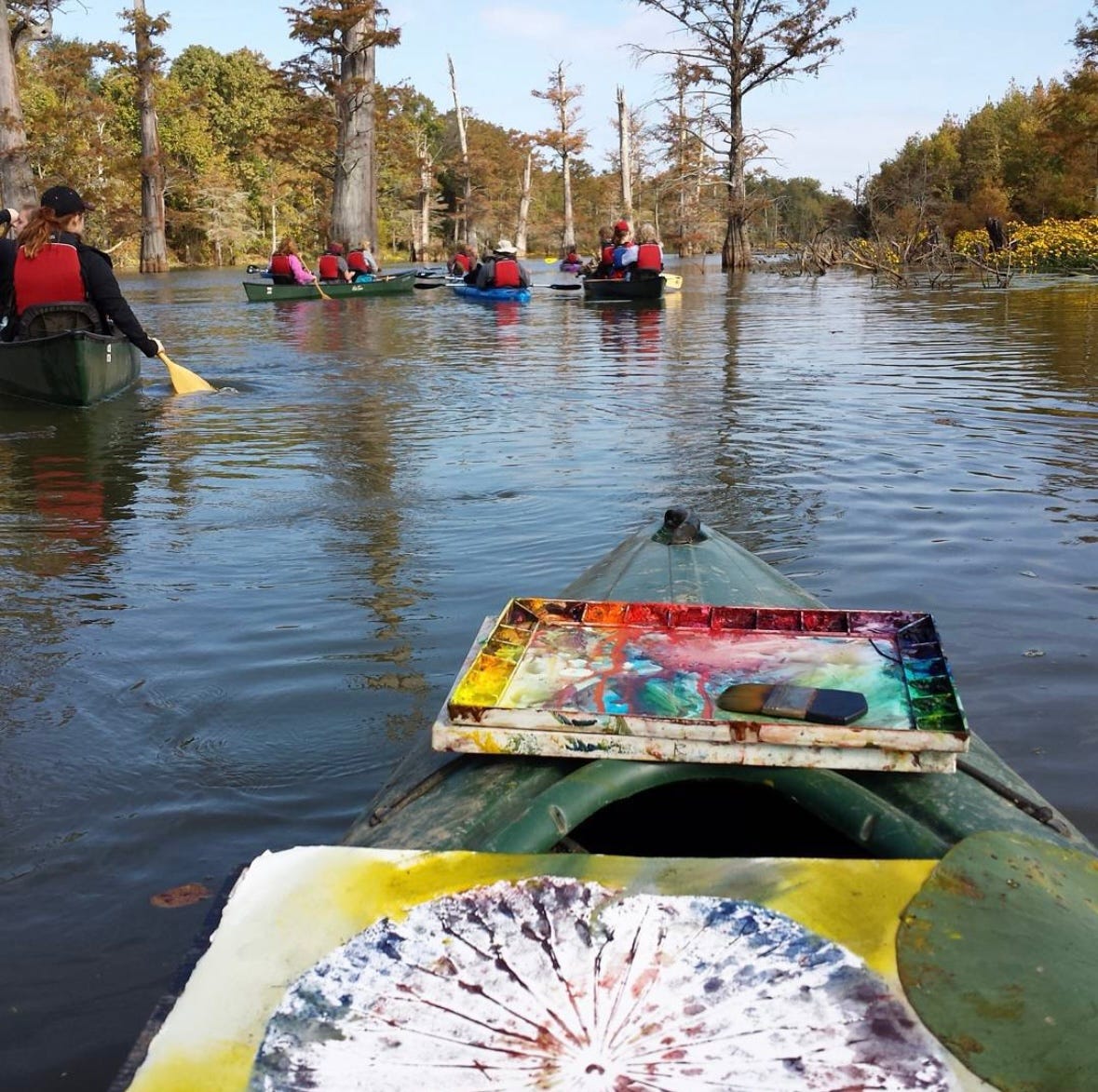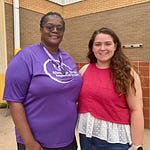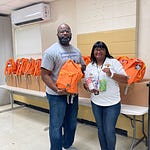We’re currently one day’s paddle from St. Louis, where we’ll be taking a rest to regroup and site-see across America’s Fourth City. We plan to share a trip update on the other side of the Arch. Until then, we thought it was high-time we introduced ourselves.
We're Sydney and Leah —friends since sixth grade, paddling partners, and the team behind this project to kayak the length of the Mississippi River while raising funds to fight childhood hunger.
In this conversation, we share how our friendship started, how paddling became part of our lives, and why this trip means more to us than just the miles. It’s about giving back to the communities that raised us, supporting kids in our home state, and creating something bigger than ourselves. We’re glad you’re here to listen.
Scroll through the transcript to see pictures!
Transcript
[Sydney]
This is Sydney Matrisciano.
[Leah]
And this is Leah Pettit.
[Sydney]
We're the friends behind River Runs Full, a 2025 Mississippi River journey to raise money for the fight against childhood hunger in North Mississippi. Today we're going to cover who we are, how we met, and our thoughts about the trip. I know how I think we met, but I also want to hear your version.
[Leah]
So we met in sixth grade. I had just moved from Ohio. That was the first time I'd ever moved.
And I was not sure who I wanted to be? So that sort of led me to just withdraw into myself and not talk to anyone. And you were like, “I'm going to invite her to come sit with me and my friends.”
You were definitely the ringleader of whatever little group that was. And at first I was just sitting with your group, reading my book and ignoring your conversation. Then I was sitting with your group, reading my book and listening to your conversation. And then eventually participating in your conversation. Both went to MSMS, sort of reconnected there, and stayed in touch.
[Sydney]
I think we remember it very similarly. It was 2012. You're right.
We were both part of a special education program called LEAP: Learning, Enrichment and Progress. So one day a week, instead of having like our normal class schedule, we went to a separate classroom and we did different activities. And I remember when you joined that classroom (because it was a small group.)
There were only like 15 or 20 of us that spent that day together versus the bigger group of a couple hundred kids. And you're right. You did seem quiet.
And I remember thinking that the cover of the book you were reading was interesting. And that being why I was like, “oh my gosh, let's get her over here. Let's get her talking to us.”
So I think we invited you to sit with us at lunch. You're right. And I don't remember how long it took you to warm up to us, but I'm glad we stayed in touch. I'm glad we're friends now.
I think reconnecting at MSMS is definitely like how we strengthen the friendship and got in enough touch to be here six years, seven years, eight years later. So many years later, some length of time later, like planning this trip.
Talk more about what MSMS was.
[Leah]
It stands for the Mississippi School for Math and Science or Mississippi School for Mathematics and Science, if you want to be fancy about it. It's a public boarding school in the state of Mississippi. So you applied your sophomore year of high school to get in.
And it was just, there was a place with really good teachers, really interesting students. One of the things that was special about MSMS is they made the students aware of how privileged we were. If I had gone straight from Grenada to MIT, I think I would be just a much worse person, because I don't think that I was trained to notice the minor advantages, I guess, that I had over my peers.
[Sydney]
It's really interesting hearing the different lessons we took because my predominant lesson from MSMS was that you're getting these advantages and these opportunities to come back to your state and uplift everyone else and uplift the community. I don't know why that feels different from like notice, just to me, like notice and do something. Like I think they taught us both notice and do.
[Leah]
I think they did. I don't think that I have the same sense of duty to place that you do. I never did.
[Sydney]
You're very Midwestern.
[Leah]
I am very Midwestern, that's where I'm from.
[Sydney]
I know, and I'm still friends with you.
Okay. Speaking of being friends with you, that is almost the only reason I got into kayaking. I have to be honest, I don't know if I have told you this, but yeah.
I have a really visceral memory of walking through like your dad's garage when you guys were building your kayak and how excited you were and just how cool it seems to me. And so filed that away as like kayaks are cool, kayaks are interesting. And even though like growing up on the farm, we had ponds and lakes and there was always water around, we weren't really a big boating family, more of a fishing or swimming family.
And it wasn't until I moved to college and lived on like Michigan where there was a sailing center and like really easy access to kayak rental or other small craft rental, that I finally got involved with the paddling community and was able to like self-actualize and get interested in the hobby. But yeah.
[Leah]
That's interesting. I also got into kayaking from building my kayak.
[Sydney]
Surprise.
[Leah]
That's one of those things: you can't build something like that and then not use it. It's not an option.
I don't know why that was the woodworking project. That was probably picked for me, to be honest - the first time, anyway - the one when I was six, seven, eight? [edit: I was nine] I don't know - the little one.
And then the second time was because I got too big for the other one.
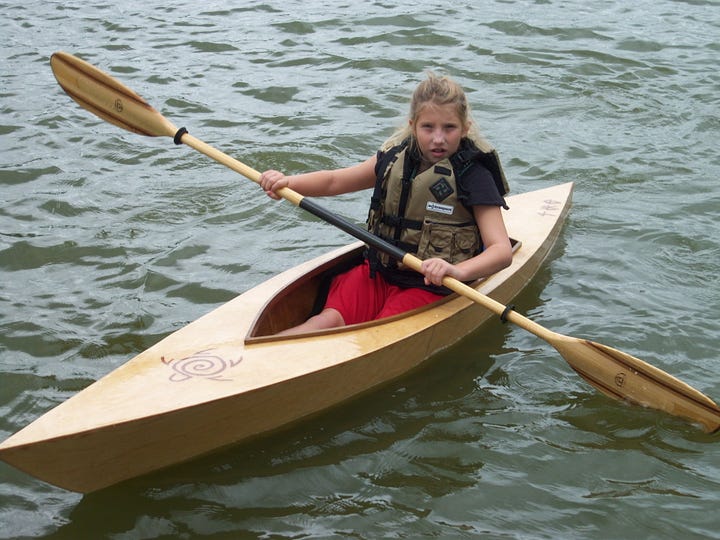
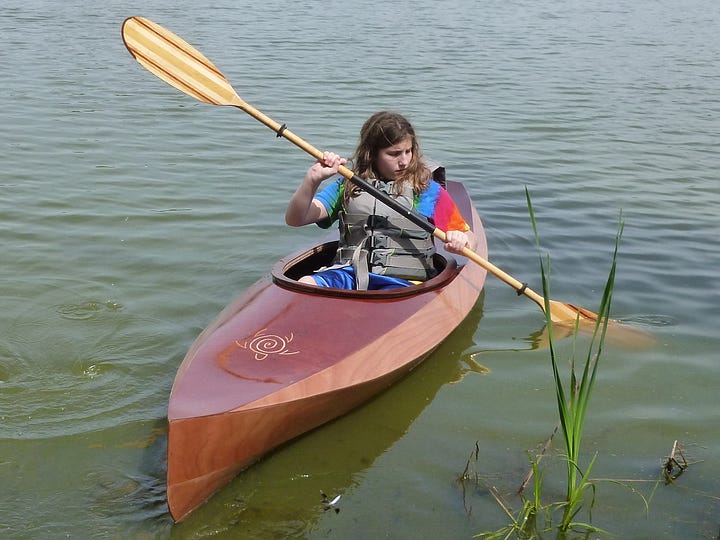
[Sydney]
You've been paddling or part of a paddling family for a long time. So what is a favorite memory from this hobby for you?
[Leah]
Yeah. I was thinking about that. I'm not sure.
[For you] Paddling is a very social thing because most of your paddling experience is with other people. For me, it's a very introspective sort of hobby. Most of my paddling experience is quiet stretches - like even if I'm with other people, it's not talking to each other except occasionally, “look at that turtle.”
The one that comes to mind for me, actually super recent (so that probably just tells me that I like paddling and I have a lousy memory), which is when I was paddling in Hong Kong. It's the first time I've been paddling in a foreign country. It was just a very different paddling experience than what I've had in the US.
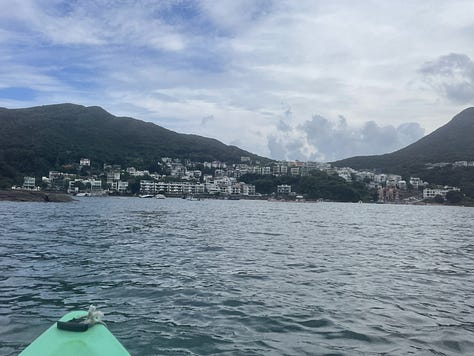
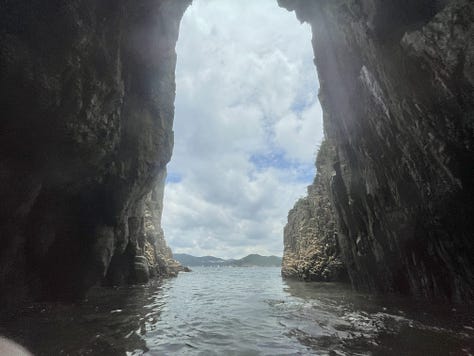
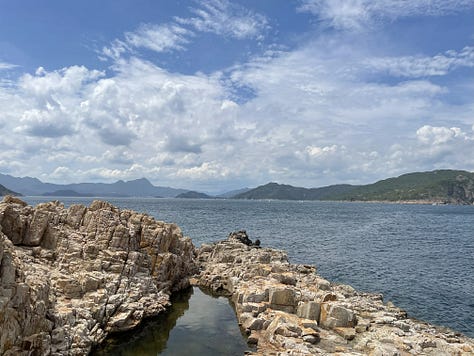
For one thing, it's open water. I don't do very much open water. The cliffs were very beautiful.
There were lots of other people around, but not people I knew. I don't know. It was a really neat, unique experience: most of what I was paddling past was not familiar in any way. So it was exciting.
[Sydney]
It sounds like it. Yeah, you're right. I guess most of my paddling is social.
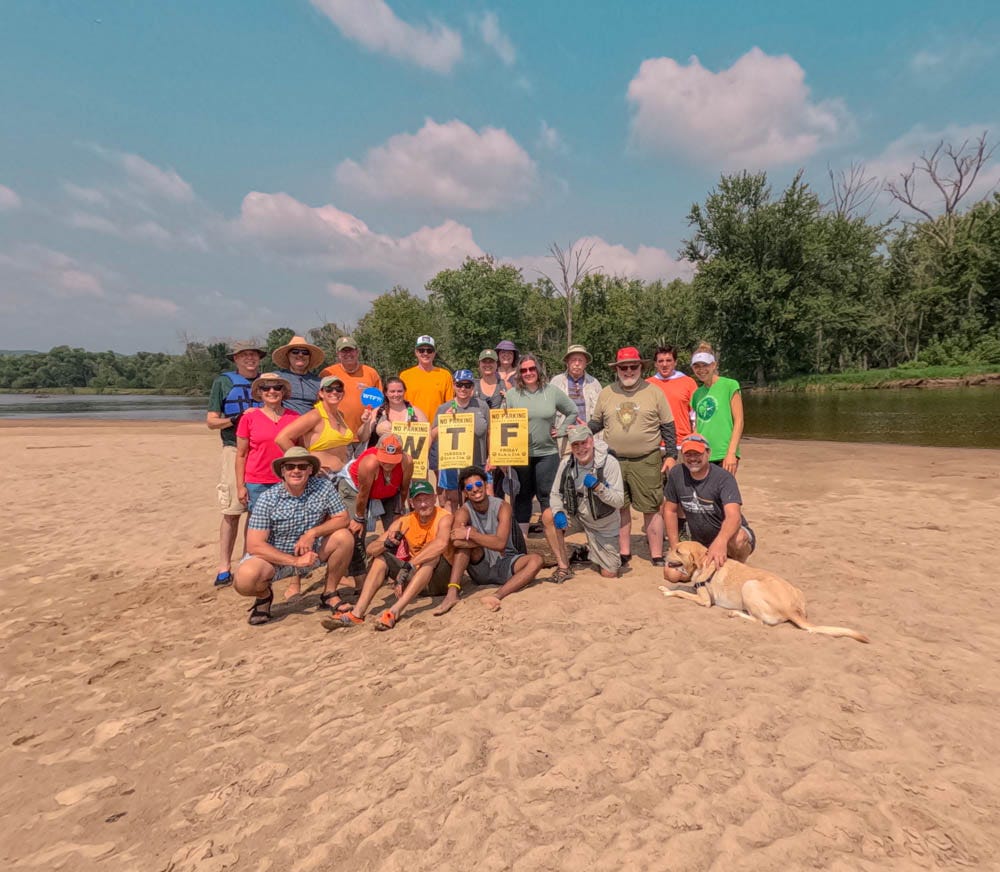
I was trying to think of an answer to this question too. And at first I was thinking about the work I do with Friends of the Chicago River, where it's trips - open to the public - just to teach and encourage familiarity with the waterways near us. We had a trip last summer in a housing project that was on the river.
And it was specifically youth-focused, first-time paddler-focused. Getting to see the kids transition from fear and suspicion of the water to, by the end of the two or three hours, having fun, trying to throw balls back and forth between the boats and splashing each other and having a good time is one of the more rewarding social paddling experiences I've had. But I had forgotten about a time I went paddling in high school and was one of the kids learning to paddle.
When I was in high school, our art program, which was led by Shirley Hamilton, did a collaboration with Robin Whitfield, the artist of Lee Tart Nature Preserve. And we didn't go to Lee Tart. We went to a different stretch of swamp or river.
But it was an art-focused paddling experience where we had a lesson on how to use natural pigments like berries, leaves, dirt. And we paddled, and we collected our pigment-making materials, and then we went back and did an art class on the bank. And that was also really formative and really communal because it was a class of like 20 or 30 of us learning together.
Yeah, you're right. Those two learning memories are really important to me, being social. Wow, this is fun to talk about together.
Let's start talking about the trip. Tell me why you wanted to do this trip at all.
[Leah]
The first time I wanted to do this trip, three years ago now. I wanted a couple of things. I wanted to decompress after college.
I also had just spent the last four years, most of the last four years, living in Boston after having spent the previous, I don't know how many, living in Mississippi, which are very different places. And I wanted to explore more about how much of that was north-south cultural differences versus how much of that was city-rural cultural differences. And the river has city and rural and north and south.
[Sydney]
That's so interesting. I didn't know that. Cool.
[Leah]
Okay. This was before. When I first had this idea, I hadn't picked where I was going to live yet.
I hadn't decided I was going to live in Kentucky right in the middle of, without making a decision. Yeah.
[Sydney]
Cool. I'm so excited to see if we still notice these differences. But yeah, tell me now.
I remember I pitched the trip to you - actually I don't remember how I pitched it to you, but I wanted to do it because I have a really long gap between taking the bar exam and starting work at the firm. And so I wanted to do something natural and immersive and beautiful where we could just be reflective and peaceful, like you were describing. And my family was worried about me doing it alone.
I only knew about people kayaking the river though, because of you. You had mentioned it to me when I visited you in Kentucky two years ago after you'd first bought the house.
Did I actually invite you or did I just tell you I was going to do it?
I think I invited you. I think I was hoping -
[Leah]
You told me you were gonna do it.
LOL. What? Really? Oh, that's so cruel of me.
Great. Okay. You take over the storytelling.
So I told you I was going to do it.
[Leah]
I said something along the lines of, “I would love to go if I could get that much time off work.” And you were like, “why don't you ask?” I was like, “I can't ask for two months off work.”
It turned out I could ask for two months off work.
[Sydney]
Okay. Wait. Great.
Because I always wanted you to be part of this trip. I'm glad I was so graceless as to not invite you. I'm glad your boss said yes.
[Leah]
You encouraged me to ask my boss for the time off and he granted it.
[Sydney]
It was amazing. Now, the second time that we're doing it, what's the motivation? Why do you want to do it this time?
[Leah]
Now it's because I feel like I'm getting old. Not physically old. Just emotionally old.
I haven't had any important projects, important drives in the last few years. Finished college now what? This was something I was excited about, a good opportunity to be like, yes, I can still do things.
I can still do fun, exciting things.
[Sydney]
Yeah, we can. Yeah. What are you most looking forward to about the trip?
[Leah]
I feel like I can't pick one thing because the things that I think I'm going to enjoy about the trip are going to come sporadically spread throughout. I know I learned on our test trip that I really enjoy morning paddling, so I'm definitely looking forward to more of that. I'm looking forward to some of the places that previous paddlers have stopped at, gone through, and just being there.
I'm looking forward to all the little mini goals, Northernmost Point, St. Louis, Chain of Rocks, all the little, “yeah, this is a milestone, I promise.”
[Sydney]
There's not one part that I'm most excited for. The whole trip is such an adventure. But I think the excitement for the people we're going to meet along the way, even on our short test trip, how the kindness of strangers, literally, when we needed the most, just appearing around the bend on a boat of their own, I'm excited to build those micro relationships and learn from the people, like North and South, rural and urban.
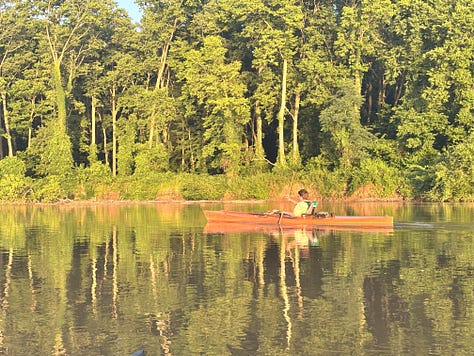
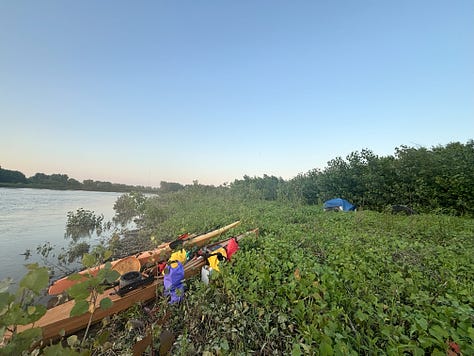
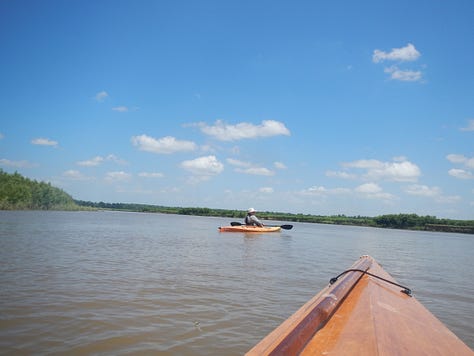
I'm also really excited for sunrises and sunsets. Those are genuinely some of my favorite natural phenomena. And when I'm in Chicago, I don't make the effort to get up early enough or go outside at dusk to watch the world changing, happening.
And so I'm really excited to just be immersed in nature and see those things for two months straight every single day. You can't ignore it through a tent, right? But I'm also really excited for the community paddle day that we're planning south of Memphis.
I think that bringing the kids on the water and providing the same experiences that I described enjoying - just being able to share love of paddling and love of the river with people from our hometowns and from our communities is going to be so special. And so I can't wait till we get to that point. That's going to be a huge milestone to me of, “yes, we did this. The trip is almost done. I promise.”
[Leah]
You: “That's the part I was here for. I can go home.”
[Sydney]
Yeah. You thought I was going to ditch you at the concert. Really, it's the paddle day.
No, I'm just so excited for this trip.
And I'm really glad that we are partnering with two charities to get to use this trip for something bigger. Because it's one thing to go off in the woods for two months for no reason, just because you want to. And another to use it to support community.
You know that the two charities that we're partnering with are Feeding the Future Mississippi and Blessings for All Empowered by Faith out of Montgomery County. And they both do a bunch of different services for the communities that they serve. But their primary goal is feeding programs.
So we're raising money in support of their feeding programs so that they can expand their programs and include more children and branch out to additional towns and schools and communities. The reason we chose these charities is because MSMS was very important to us and we wanted to do something related to school, but you can't focus in school if you aren't fed.
[Leah]
Like I told you before, I want the money that we raise to be meaningful, to feel confident that money is going directly into the community.
[Sydney]
In Ms. Calbrina’s, she makes a point to say she's not getting paid, her mom's not getting paid, none of the volunteers are paid. Every dollar that goes to her organization goes to the kids or goes to the community somehow. And I think these two charities do fit the hope: because they are so small and because they are really tied to the community.
Tell me something you love about Mississippi, because I actually do want to know this.
[Leah]
I really appreciate the fact that kindness isn't earned or deserved in Mississippi. Even people who don't like you will help you out.
It’s not, “I don't know that person, I'm going to help them.” It’s, “I actively dislike that person, but I'm still going to help them.”
Us Midwestern folks, we'll help people we don't know. But if we don't like you, you're out of luck.
[Sydney]
Harsh. Wait, I think there was some beautiful poignancy in kindness not being earned or deserved. I have asked this question of a lot of people, not just people for the river trip, but have not tried to answer it myself, because it's not that I love any one thing about Mississippi or that I love it particularly.
It's like where I'm from, everything that shaped me into who I am as Mississippi. How can I not love it? But something specific about the community: What I love about Winona or Montgomery County is the way that they've cared for my family for so many years.
When we went through hard times in the 2010s, churches stepped up, random people stepped up to help us move and get us the resources we need. Anytime something good happens in my life, I've got a whole town there to celebrate me, to cut the clippings out of the newspaper and send them to my grandparents, or give me a hug at church and ask what the new thing is. So I think it's that feeling of family and community, that place engenders, and the love that I feel from those people.
Because they do share it freely, both with people of the town and people who aren't. That's ultimately what this trip is about for me. I mean, it's more than the miles.
It's about love for the places that raised us, for the people who poured into us, and being able to return that spirit of generosity and care to the next generation of kids. It's kids that we hope are going to grow up knowing that they matter. We're paddling for them, for their full stomachs, their full hearts, and for futures that feel wide open.
[outro music]
Thanks for joining us today to learn more about our journey, River Runs Full. If you want to be part of that love and action, visit riverrunsfull.com to learn more about each charity that we're supporting and to donate. You can also donate on our GoFundMe page.
Every dollar helps feed a child, and every child deserves to feel full.


